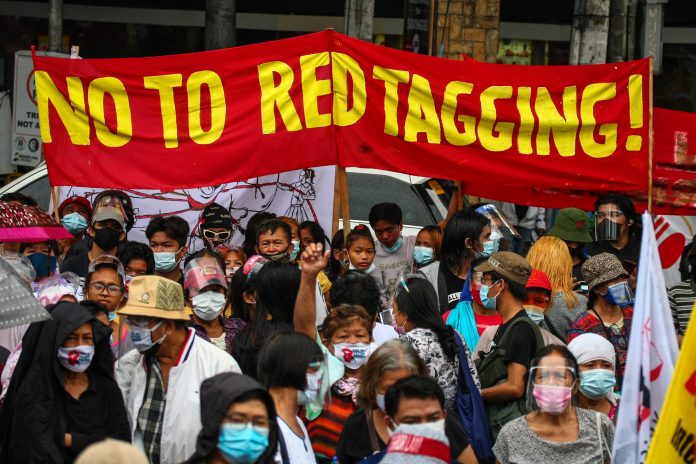Ferdinand Marcos Jr. said last week that he does not see any need to abolish the National Task Force to End the Local Armed Conflict (NTF-ELCAC). He claimed that red-tagging does not come from the government but from “kung sino-sino” (other people).
There is irony in Marcos’s statement. NTF-ELCAC, a task force created by virtue of President Rodrigo Duterte’s executive order, has been the biggest red-tagger. It is notorious for tagging individuals and organizations as “communist-terrorists,” “urban operatives,” “communist-propagandists,” and the like. A mere browsing of the NTF-ELCAC’s Facebook page would reveal how the task force routinely links legal mass organizations to so-called “communist-terorrist groups,” a phrase coined by the Philippine military. It even presented a list of so-called communist fronts in a Senate hearing on December 1, 2020.
A recent study by the National Union of Journalists of the Philippines (NUJP) revealed that of the 159 incidents of red-tagging against journalists and media groups from 2016 until April 2024, 60 percent of the incidents were perpetrated by state actors. The same study also showed that 40 percent of the 159 incidents took place within just two years of the new administration.
By defending the existence of the NTF-ELCAC, Marcos makes red-tagging a policy and provides a go-signal for other human rights violations that often happen after victims have been labeled.
No less than the Supreme Court, in a recent ruling on the case filed by Bayan Muna leader Siegfred Deduro, declared that red-tagging is a threat to life, liberty, and security. “Being associated with communists or terrorists makes the red-tagged person a target of vigilantes, paramilitary groups, or even State agents,” the SC added.
In March 2022, the human rights alliance Karapatan revealed that 427 activists were red-tagged before they were killed.
As early as 2007, then UN Special Rapporteur on Extrajudicial, Summary or Arbitrary Executions Philip Alston pointed out the dangers of red-baiting and how it serves as a precedent to graver human rights violations. Nearly two decades later, two more UN Special Rapporteurs, in separate statements following their visits to the Philippines, called on the Philippine government to abolish the NTF-ELCAC.
After his ten-day visit, UN expert on climate change and human rights Ian Fry said on Nov. 15, 2023, that the NTF-ELCAC has been operating beyond its mandate and with impunity.
Early this year, UN Special Rapporteur on Freedom of Expression and Opinion Irene Khan also called for the disbandment of the NTF-ELCAC, saying “It is outdated, and it does not take into account the ongoing prospects of peace negotiations.” “I have asked the government personally, whether they have a policy on red-tagging and I was reassured that it does not encourage or endorse it. But there is clear evidence that red-tagging or terror-tagging are being practiced by security forces as part of their counter-terrorism strategy,” said Khan.
Khan also suggested that the Philippine government pass an executive order or any measure that would discourage the practice of red-tagging and discipline those who would violate the policy.
By ignoring these recommendations, the Marcos administration is not changing Duterte’s counterinsurgency strategy but it is honing it to its advantage. That Marcos utters pro-human rights rhetoric before the international community but essentially does the same proves how insidious his administration is.
On the ground, activists, human rights defenders, and journalists are pushing back, asserting the right to organization, the right to free speech and expression, and the right to seek redress for grievances. These rights have been fought for, and are still being fought for every day.
Ronalyn “Len” Olea is the editor-in-chief of Bulatlat.com, the country’s top alternative online news site that covers politics, human rights, indigenous people, and Filipino culture. Olea is the Secretary-General of the National Union of Journalists in the Philippines. She has been subjected to a series of red-tagging incidents, vilification, and harassment because of her reporting.
This article was first published by Bulatlat.com









